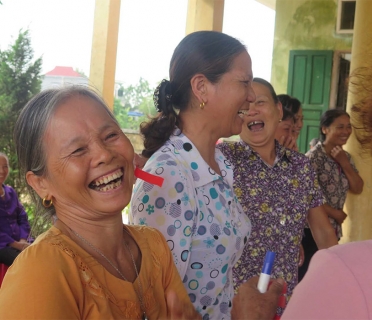
Today (Wednesday 15 May), HelpAge International and AARP are launching our latest Global AgeWatch reports, Tanzania insights: The right to health and access to universal health coverage for older people and Vietnam insights: The right to health and access to universal health coverage for older people.
The reports follow Global AgeWatch Insights 2018, which analysed the extent to which older people’s right to health in low and middle-income countries is realised and the barriers that exclude them from health systems and services.
Our new reports delve deeper and explore the national context of these barriers in Vietnam and Tanzania, and assess progress towards including older people in universal health coverage (UHC). Despite national differences in how health services and financial protection are provided, there are a number of key issues that are similar in both contexts and settings:
- Despite governments’ policy commitments to achieving UHC, many older people remain excluded from accessing health services and financial protection.
- Older people struggle to access affordable, appropriate and good quality care due to low levels of awareness of their right to health and lack of recognition of those rights by health and social protection systems.
- Data systems designed to inform the planning and delivery of health services systematically exclude older people.
The country reports highlight that despite governments’ policy commitments to achieving UHC, many older people remain excluded from access to health services and financial protection.
In Tanzania, 88% of people aged 50 and over are without any form of health protection. In Vietnam, the coverage by social health insurance varies by age, marital status, education, wealth and living area. While 90% of those aged 80 and over are covered by social health insurance, 10% remain without cover. Of those aged 50 to 59, just 64% are covered.
The reports also found that when older people had no insurance, they struggled to access vital treatments and services.
“You can have an intention to allocate some money for health services, but due [to] poverty you end up using it to purchase other items such as food,” said a woman from Tandale in Tanzania.
An older person from Hai Duong, Vietnam said: “older people who live in rural areas have to depend on their children’s support and they do not have money to pay for health insurance.”
The reports also find gaps in coverage and quality of services. In Vietnam, vital services for diabetes are not included in health insurance packages for community-level health facilities. This is reflected in the low prevention rates as only 42% of older people with diabetes have been screened.
“We can provide diagnosis and treatment services for diabetes, but the cost of these services are not included in health insurance,” said a community health station representative in Don Thap, Vietnam
In Tanzania, nearly 80% of health facilities, for example, dispensaries, health centres, hospitals and clinics, diagnose or manage NCDs. However, only 10% of staff who diagnose and manage diabetes had training on the condition.
Additionally, constrained resources for service delivery, administrative barriers, and pressures on health providers to generate income and recover costs mean older people are often denied their entitlements by health providers. Either they are declined services they are entitled to receive for free or provided with inadequate treatment, such as incomplete medication dosages.
The reports show large inequalities within the older population when accessing to health services and protection. Generally those in rural areas who have lower levels of education or income are at a greater disadvantage.
Both reports highlight that there is a systematic lack of data on older people’s access to health or their health issues. This means there is insufficient evidence to effectively inform the planning and delivery of health systems at a national level.
To ensure that older people are able to relies their right to health, the report calls on governments at a national level to:
- continue efforts to expand social health insurance coverage to all, especially to reach older people with low levels of education or living in low-income households
- ensure households with older people have financial protection from catastrophic health expenditure
- develop an appropriate health insurance benefit package that covers medication, assistive devices, and diagnostics and management for NCDs across the different levels of health facilities.
Ahead of the 72nd World Health Assembly and the first high-level meeting on UHC, HelpAge International and Age International are bringing together a diverse group of stakeholders from the UK Government, UN agencies, civil society and academia at a policy rountable to examine older people’s access to UHC. The discussion will inform follow-up advocacy at the WHA and by the HelpAge global network before the UN high level meeting on UHC in September.
Visit globalagewatch.org to learn more.
